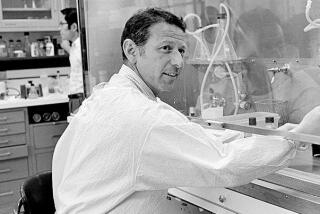Genetic Research at Stanford : Center to Teach ‘Medicine of the Future’
- Share via
STANFORD — Nobel Prize-winning biochemist Paul Berg said Thursday that a $50-million Center for Molecular and Genetic Medicine, to be built at Stanford University by 1988, “will train physicians skilled to practice the medicine of the future.”
That medicine will include gene therapy, which could involve removing a gene, modifying one or preventing birth defects by placing a new version of a gene into the cell of a fetus.
Among other areas the center will be involved in are the development of vaccines for a variety of diseases, cancer research and bone marrow transplants.
The privately financed center, in the planning stage for two years, can now begin construction after receiving $12 million from the Arnold and Mabel Beckman Foundation and $17 million from the Howard Hughes Medical Research Institute, said Stanford University President Donald Kennedy.
4 Interrelated Areas
About 40 scientists will work at the center in four interrelated areas--the Hughes laboratory unit in molecular and genetic medicine, a department of molecular and developmental biology, a department of molecular and cell physiology, and Stanford’s department of biochemistry, whose laboratories will bear the Beckman name.
Berg said the keystone is the Hughes unit, in which scientists will study genes related to human disease as well as the development of new diagnostic tests for known and newly recognized diseases and therapies based on gene or cell replacement.
“It will create a focus at which first-rank science and first-rank medicine will be side by side,” said Berg, who received the Nobel Prize in chemistry in 1980.
“All these years we kept touting what the potential benefits of the new biology were going to be and how it would affect many fields, including medicine,” he said. “We couldn’t predict the exact time, but there was no question that it was going to happen.”
‘A Critical Time’
Kennedy said the gifts come “at a critical time in which the future underpinnings of health research depend on capital for new laboratories and equipment--something the federal government has neglected to provide for the last 15 years.”
Arnold Beckman, chairman and founder of Beckman Instruments, said: “A large part of the impetus of the genetic revolution grew out of research in biochemistry at Stanford under the leadership of Drs. Arthur Kornberg and Paul Berg.
“My purpose is to help guarantee that biochemistry at Stanford will remain strong and be able to contribute to the next revolution of biomedical advances.”






